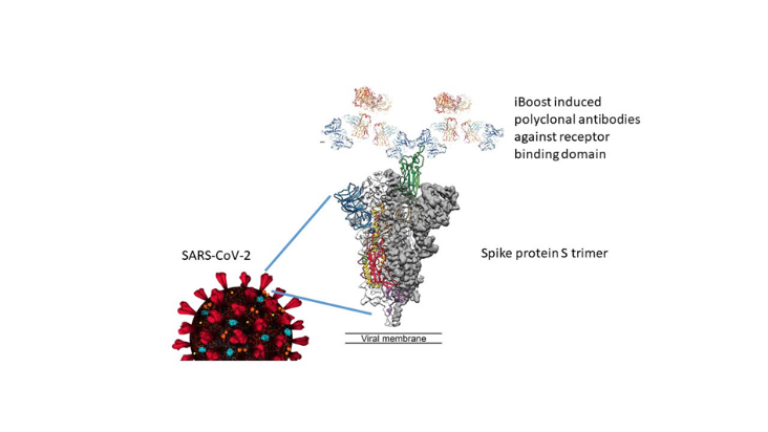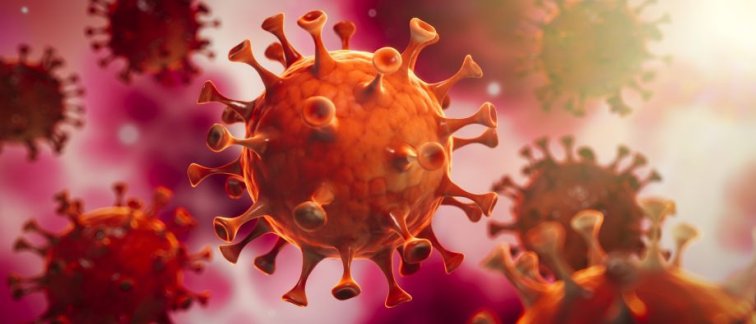1. Precision vaccination against SARS-CoV-2 and future corona viruses
By Arjan Griffioen, dept. of Medical Oncology, Cancer Center Amsterdam, Amsterdam UMC
The Angiogenesis Laboratory at Amsterdam UMC is busy making a vaccine against COVID-19.
Recently, the group of Arjan Griffioen and collaborators developed a new technology called Immuno-Boost – or iBoost – to induce efficient antibody responses to self-antigens. This technology is being used to make vaccines against components of solid tumors for immunotherapy and also possibly the prevention of cancer. After the outbreak of SARS-CoV-2, it became clear that protective antibody responses against the virus are weak and appear only at a rather late time point. Our researchers realized that iBoost can possibly help at inducing efficient antibody responses to SARS antigens as well. A major advantage of iBoost is that antibody responses can be targeted to specific sites on proteins. Targeting sites in the spike protein S of SARS-CoV-2 that are conserved among known coronaviruses can maximize the chance that the new vaccines will also be effective during potential future outbreaks of novel coronaviruses. Sufficient funding was secured, and a team of researchers has already successfully designed, produced and purified the first vaccine, which is now being tested for neutralization of coronavirus infection. The work is executed in close collaboration with CimCure BV, an Amsterdam UMC spinoff company, and the Netherlands-based vaccine company Intravacc BV.

2. GlobalSurg-CovidSurg Week: Determining the optimal timing for surgery following SARS-CoV-2 infection
By Daan H.L. Lemmers, Anne Roelofs, Marc G. Besselink, dept. of Surgery, Cancer Center Amsterdam, Amsterdam UMC
The GlobalSurg and CovidSurg collaboratives are two international surgical research networks joining efforts to deliver the GlobalSurg | CovidSurg-Week study.
The GlobalSurg | CovidSurg-Week study is an international multi-center cohort study that aims:
(1) To determine the optimal timing of surgery following SARS-CoV-2 infection
(2) To determine key global surgical indicators, such as postoperative mortality.
In order to achieve these aims, this study will include all patients undergoing surgery with a preoperative, postoperative or no SARS-CoV-2 infection. All hospitals are eligible to participate, regardless of having admitted SARS-CoV-2 infected patients or not.
Collaborators will collect data on all consecutive eligible cases within the scope of their practice (i.e., their surgical specialty / surgical team). Multiple specialties can contribute from each hospital, but it is not mandatory for all specialties to participate. A mini-team of up to three collaborators will collect data over 7 consecutive days, as well as 30-day follow-up data.
By October 21, 2020, over 25,000 patients have been registered, with 1,510 participating hospitals from 114 countries. Recruitment was closed on November 1, 2020.
Conclusion: The CovidSurg Cohort study has demonstrated the adverse outcomes of surgery in SARS-CoV-2 infected patients. Early results from the CovidSurg-Cancer study show that surgery following SARS-CoV-2 infection is associated with poorer outcomes, even if the surgery is several weeks after the initial diagnosis. However, additional detailed data are needed to explore this further.
For more information you can visit the website:
https://globalsurg.org/surgweek/
Or watch the YouTube link: https://www.youtube.com/watch?v=ffprz8rDDgE&feature=emb_title&ab_channel=CovidSurg
3. Effects of the COVID-19 pandemic on care for patients with esophageal or gastric cancer
By Rob Verhoeven, dept. of Epidemiology, Amsterdam UMC
he COVID-19 pandemic and resulting societal implications is affecting the usual care for patients with cancer. We initiated a project to determine the impact of the pandemic on care for esophageal or gastric cancer patients.
This project consists of two phases: the first will provide insights into the observed and expected number of esophageal and gastric cancer diagnoses during the pandemic, and the second phase will focus on alterations in the treatment of patients who are diagnosed or treated during the pandemic. The analyses will be done based on nationwide data from the Netherlands Cancer Registry (NCR) and Nationwide Network of Histopathology and Cytopathology (PALGA).
Preliminary results from the first phase show that during the first COVID-19 wave, approximately 20% fewer cases were diagnosed than expected based on previous years. From May to early October, the observed incidence differed little from the expected number of esophageal and gastric cancer cases. Interestingly, a compensatory increase in diagnoses has not yet occurred. This suggests that there is still a backlog in the amount of diagnosed cases.
We are currently writing a scientific manuscript on these results. We will also include the number of expected and observed diagnoses during the second wave in this report.
Preliminary results regarding the second phase of the project are not available at this time.
Collaborators at Amsterdam UMC: Dr. Nicole van Grieken (pathologist), prof. dr. Hanneke van Laarhoven (medical oncologist), prof. dr. Mark van Berge Henegouwen (surgeon), Benthe Doeve (PhD student) and Rob Verhoeven (epidemiologist).
Collaborators at other centers: Prof. dr. Camiel Rosman (surgeon, Radboudumc), prof. dr. Peter Siersema (gastroenterologist, Radboudumc), dr. Johanna van Sandick (surgeon, Antoni van Leeuwenhoek).
4. Dutch Oncology COVID-19 Consortium (DOCC): Outcomes of COVID-19 in patients with cancer in a nationwide cohort study
By the Dutch Oncology COVID-19 Consortium, represented by Hanneke van Laarhoven, dept. of Medical Oncology, Cancer Center Amsterdam, Amsterdam UMC
From the abstract published in Annals of Oncology 31, suppl. 4, September 2020.
The coronavirus disease 2019 (COVID-19) pandemic is having significant impact on oncological care (Joode et al, Eur J Cancer 2020;136:132-139) and patients with cancer might have an increased risk for a severe outcome of COVID-19. In order to identify risk factors associated with a worse outcome of COVID-19, a nationwide registry was developed for patients with cancer and COVID-19.
This ongoing multicenter nationwide observational cohort study was designed as a quality of care registry and is executed by the Dutch Oncology COVID-19 Consortium (DOCC), a collaboration of oncology physicians in the Netherlands. A questionnaire was developed to collect pseudonymized patient data on patients’ characteristics, cancer diagnosis, cancer treatment, and outcome of COVID-19. All patients with COVID-19 and a cancer diagnosis or cancer treatment in the past 5 years were eligible for inclusion.
The findings in this registry indicate that patients with a hematological malignancy or lung cancer have an increased risk of a worse outcome of COVID-19. During the ongoing COVID-19 pandemic, these vulnerable patients should avoid exposure to SARS-CoV-2. Treatment adjustments and prioritizing vaccination, when available, should also be considered.
5. COVID-19 infections in patients with Inflammatory Bowel Disease
By Mark Löwenberg, dept. of Gastroenterology, Amsterdam UMC
I-CARE, which stands for Inflammatory Bowel Disease (IBD) CAncer and SeRious Infections in Europe, is a large observational European prospective cohort study designed to shed light on the risk of cancer or serious infections in IBD patients using immunosuppressive and biologic therapies. The study was initiated by GETAID, Groupe d’Étude Thérapeutique des Affections Inflammatoires Digestives, the national IBD society in France.
The primary objective of I-CARE is to study real-world safety outcomes, with a specific focus on cancer – especially lymphomas – and serious infections, in IBD patients receiving treatment with anti-Tumor Necrosis Factor (TNF) agents with or without additional immunosuppressive therapies. While these treatments can reduce the need for major bowel surgery in many patients, they place patients at greater risk of developing cancer. Dr. Mark Löwenberg, gastroenterologist at Amsterdam UMC, participates in this study by enrolling patients who then complete annual e-questionnaires and monthly e-diaries to record disease activity.
Given the current situation with COVID-19, GETAID recently added a temporary questionnaire to study the prevalence of COVID-19 infections as well as the potential role of various therapies on the severity of COVID-19 infections in IBD patients. A secondary outcome relevant to cancer research may provide insights into the possible impacts of COVID-19 infections on malignancies.

